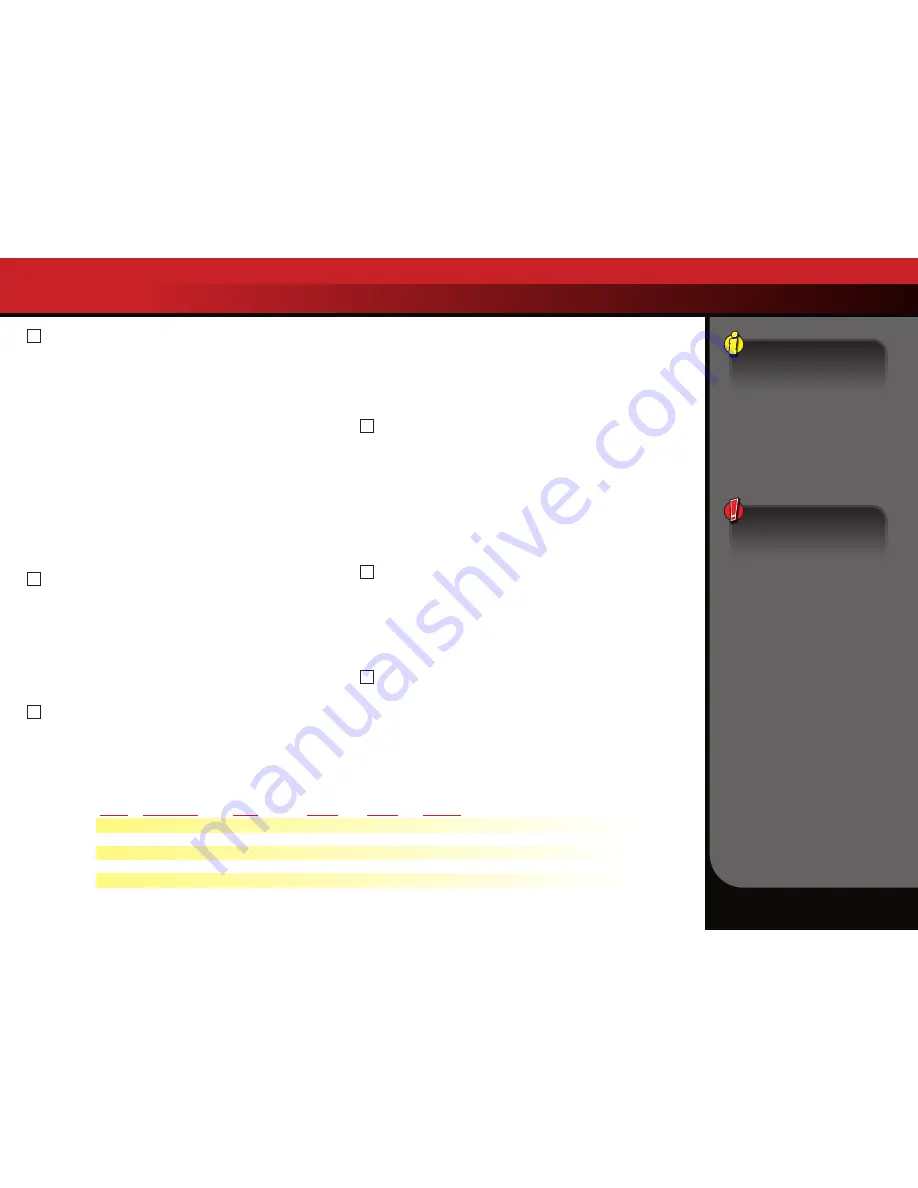
NITRO RUSTLER • 25
ThE TRx 2.5 RacING ENGINE
Tank
1
2
3
4
5
Throttle
1/4
1/2
1/2
Full
Full
Time
2 Seconds
2 Seconds
3 Seconds
3 Seconds
5 Seconds
cool
15 Minutes
15 Minutes
-
-
-
Body
Off
On
On
On
On
Notes
Apply throttle gradually.
Apply throttle gradually.
Reduce idle speed if necessary.
Keep your driving consistent.
Accelerate over 3 second count, hold for 2 seconds.
Tank 1
1. Drive the model with the
body off.
2. Driving procedure:
Gently pull the throttle trigger to 1/4 throttle over
a 2-second count. Then gently apply the brake to stop
. Count the
two seconds out while accelerating: one thousand one, one thousand
two, and then stop. Operate the throttle trigger as smoothly as you
can.
Repeat this starting and stopping procedure until the first tank
of fuel is nearly empty.
3. Look for thick blue smoke exiting the exhaust outlet. If there is
no smoke, richen the high-speed needle 1/4 turn, by turning the
needle counterclockwise.
4. When the fuel tank is nearly empty, shut off the engine by pinching the
fuel line connected to the carburetor (use the installed clamp).
5. Let the engine cool for 15 minutes.
Note: If at any point the engine cuts out or stalls during gentle
acceleration, richen the high-speed needle 1/4 turn by turning the needle
counterclockwise.
Tank 2
1. From tank 2 forward, Nitro Rustler should be driven
with the body on.
2. Driving procedure:
Gently pull the throttle trigger to 1/2 throttle over
a 2-second count. Then gently apply the brake to stop.
Count the
two seconds out while accelerating: one thousand one, one thousand
two, and then stop.
Repeat this starting and stopping procedure
until the second tank of fuel is nearly empty.
3. When the fuel tank is nearly empty, shut off the engine and let it cool
for 15 minutes.
Tank 3
1. Driving procedure:
Gently pull the throttle trigger to 1/2 throttle over
a 3-second count. Then gently apply the brake to stop.
Count the
three seconds out while accelerating: one thousand one, one thousand
two, one thousand three, and then stop.
Repeat this starting and
stopping procedure until the third tank of fuel is nearly empty.
2. As the engine loosens, the idle speed may increase and cause
the model to try to creep forward when stopped. Reduce the
idle speed by turning the idle speed adjustment screw (see page 15)
on the carburetor counterclockwise.
3. When the fuel tank is nearly empty, shut off the engine and refuel.
From here on, you do not need to let the engine cool between tanks.
Tank 4
1. Driving procedure:
Gently pull the throttle trigger to full throttle over
a 3-second count. Then gently apply the brake to stop.
Count the
three seconds out while accelerating: one thousand one, one thousand
two, one thousand three, and then stop.
Repeat this starting and
stopping procedure until the fourth tank of fuel is nearly empty.
2. Apply the throttle gradually! Your finger should not reach full throttle
until the end of the three-second count.
3. Keep your driving smooth and consistent.
4. When the fuel tank is nearly empty, shut off the engine and refuel.
Tank 5
1. Driving procedure:
Gently pull the throttle trigger to full throttle over
a 3-second count, hold for 2 more seconds, and then gently apply
the brake to stop.
Count the five seconds out while accelerating.
Repeat this starting and stopping procedure until the fifth tank of
fuel is nearly empty.
2.
When the fuel tank is nearly empty, shut off the engine and refuel.
Tank 6
STOP!
Clean your air filter before you proceed.
Refer to the instructions
on page 19. During the sixth tank of fuel, the engine can be tuned for
general performance use. Proceed to Tuning your TRX 2.5 Racing Engine.
As you gain experience in
the hobby, you may discover
that many people have
differing opinions on what
is the proper procedure to
break-in a model engine.
Only use the Traxxas break-in
procedure. Other break-in
procedures could result in a
weak, damaged, or otherwise
poor performing engine.
The procedure outlined
here was extensively tested
and proven to yield better
performing engines than
other “common” break-in
methods. Even if you have
years of experience using
model engines, please do not
ignore this caution!
High Altitude Operation:
If you live in a high altitude
region (5000 or more feet
above sea level), the lower air
density may require you to lean
your high-speed fuel mixture
slightly from the factory break
in settings. Try this if you are
experiencing difficult starting
or extremely sluggish engine
performance at high altitude.












































